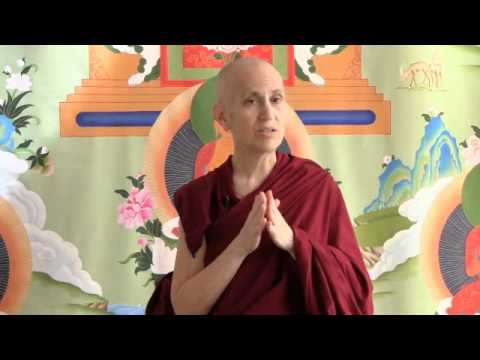The thieves of wrong views
A Crown Ornament for the Wise, a hymn to Tara composed by the First Dalai Lama, requests protection from the eight dangers. These talks were given after the White Tara Winter Retreat at Sravasti Abbey in 2011.
- Wrong views are like thieves that destroy our virtue
- The dangers of not believing in karma
The Eight Dangers 09: The thieves of wrong views, part 1 (download)
We’ve done the lion of pride, the elephant of ignorance, the fire of anger, and the snake of jealousy. They sound nasty. That’s why we ask Tara to protect us from these dangers, because they’re nasty! So, the next one is the thieves of distorted views—the thieves of wrong views:
Roaming the fearful wilds of inferior practice,
And the barren wastes of absolutism and nihilism,
They sack the towns and hermitages of benefit and bliss:
The thieves of wrong views—please protect us from this danger!
When we have thieves around we lose everything that’s worthwhile. It all vanishes like that. And if we can’t detect a thief as a thief, and invite him into our house, then it’s just making it easy, you know, and we’re going to be left with nothing.
Here thieves are compared to wrong views because, when our minds are overwhelmed with wrong views all of our virtue gets stolen—all of our virtue is removed.
Now, why is that? Well, when we have wrong views then we don’t create any virtue, because it prevents us from creating virtue.
Here we’re talking about very specific wrong views. For example, if we don’t have any conviction that our actions have an ethical dimension, and that they produce results that we ourselves will experience…. If we don’t have any conviction in that, then it becomes very difficult to make any effort to really create virtue.
Now, that’s not saying that every person who doesn’t believe in karma doesn’t create any virtue. It’s not saying that. Because people who don’t believe in multiple lifetimes and things like that, they still create virtue. But when you have a belief in karma, then you become much more highly motivated to create virtue because you realize that you’re creating the cause for your future life’s happiness, you’re creating the cause that will support your attaining liberation, you’re creating the cause that will enable you to attain full awakening. Whereas, if you don’t have any belief in karma, then you don’t feel motivated to create causes in that kind of regard. You may create virtue because you believe it’s a good thing to do, and it’s right to do. Or if you are a member of a theistic religion, you may create virtue because God commanded you to, or something like that. But it’s not going to ripen in exactly the same way as if you have a motivation for liberation and enlightenment if you have that kind of view. Okay?
Now, people who don’t believe in karma and its effects still do believe that their actions have an ethical dimension. Somebody may be a Christian and avoid negative actions because they don’t want to be reborn in hell. They realize their actions have an ethical dimension. And they do create virtue. And secular people who don’t believe in God also create virtue because they think this is the right thing to do and I’m doing it because it’s the right thing to do. But it’s going to be a little bit different because they don’t have the idea of liberation and enlightenment. Okay?
Okay, maybe we’ll stop with that. We’ll get onto some more wrong views tomorrow. Kind of sit and digest that one for a while.
Venerable Thubten Chodron
Venerable Chodron emphasizes the practical application of Buddha’s teachings in our daily lives and is especially skilled at explaining them in ways easily understood and practiced by Westerners. She is well known for her warm, humorous, and lucid teachings. She was ordained as a Buddhist nun in 1977 by Kyabje Ling Rinpoche in Dharamsala, India, and in 1986 she received bhikshuni (full) ordination in Taiwan. Read her full bio.


